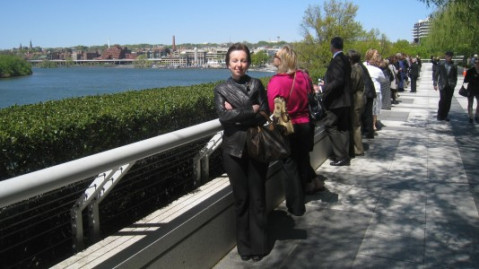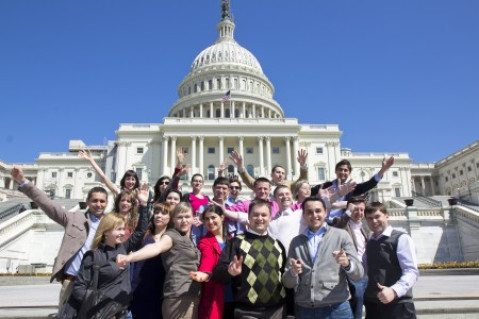Widgetized Section
Go to Admin » Appearance » Widgets » and move Gabfire Widget: Social into that MastheadOverlay zone
ASPA Promotes Good Governance Worldwide: 6 Month Update
Warren Master
Six months ago, ASPA launched a new Web site–Good Governance Worldwide –aimed at building connections among practitioners, researchers and other applied academics in the U.S. and across the globe. Its goal: to improve governance practice, particularly in modernizing and emerging democracies.
Thanks to the many voluntary contributions from both individuals and institutions, the site now offers a wide array of best practice content–through e-articles, commentaries, book reviews, interviews, blogs, podcasts, videos, topical forums, etc.–and already has begun opening networking opportunities for practitioners, applied researchers, PA students, trainers, and technical consultants, among others. Hopefully, many of ASPA’s sections and chapters will share additional applied content with this worldwide community of practice–proven tools, techniques, strategies and field-tested experience that offer useful takeaways through such a global online vehicle.
Navigating the Site
Based on “field-testing” during the past six months, the site seems easy enough to navigate. On the “About” page, you‘ll find the usual suspects that explain and describe the site’s purpose, affiliates, structure and more.
The “Interact” page is devoted to many of the networking vehicles we’re looking to put in play; and the “Contact” page lets you weigh in singularly–by submitting article ideas and questions and responding to calls for content and editorial guidance.
Clearly, the pull-down getting the most action is the “Content” tab. For example, you’ll find original, featured works and lots of contributions from, among others:
- The Public Manager’s 40+ years of archival material
- Harvard Kennedy School’s Kokkalis Program on Southeastern and East-Central Europe – rich in video interviews and seminars featuring distinguished speakers
- Princeton University’s Innovations for Successful Societies (ISS) – wide range of case illustrations from around the world
- American Councils for International Education – insight into the benefits and personal stories behind international exchanges
- The Alliance for International Educational and Cultural Exchange
- United Nations
- World Bank
- ICMA
- Global Connections TV
- South-South News
Featured Content
Not only is our focus worldwide, but it moves laterally and eclectically across the many bureaucratic silos that impede collaborative governance. Some of the featured works over the past six months include:
- Better Government, Better Services in Liberia – original article by Oblayon B. Nyemah on a road map to reduce poverty and place the country on a path of positive socio-economic growth and development
- Promoting Minority Rights in Kosovo and Bosnia and Herzegovina – article by Sarah Ringler that examines collaborative techniques in the still-dicey Balkans
- Strengthening the Global Community through Exchange Programs – original article by David Simpson that shares a tapestry of efforts underway requiring broad, international collaboration and cooperation
- Tetra Pak in Bangladesh: Partnering to Improve Nutrition and Develop the Dairy Industry – case illustration of a collaborative effort between the US Department of Agriculture’s Food for Education Initiative and the Government of Bangladesh
- The UN’s Response on Behalf of Children in Armed Conflict – video-interview by Bill Miller of Radhika Coomaraswamy, U.N. Under-Secretary-General, Special Representative for Children and Armed Conflict
- Entrepreneurial Municipal Governance in Slovenia – original article by Miro Hacek on the challenges and innovations of inter-governmental and public-private collaboration in the former Yugoslav republic
- Conjuring and Consolidating a Turnaround: Governance in Bogotá, 1992-2003
- Mexico’s Perfect Storm: Using the Narcotrafico Threat to Build Governance Capacity in the U.S. and Mexico – original commentary by Don Klingner emphasizing the critically collaborative nature of this highly-charged challenge
- Chile Moves Towards Independent Program Evaluation of Government Agencies – video featuring Patria de Lancer Julnes
- Citizen Power in an Afghanistan Village – article highlighting a collaborative effort between the US Agency for International Development and the ICMA, among others
American Councils for International Education
Having begun work on this piece during our recent Independence Day week, let me bore in a little more closely on the work of one of our site’s affiliates. With a presence in the U.S., Russia and Eurasia for nearly four decades, in addition to representation in over 30 countries across Asia, the Middle East and Southeastern Europe, the American Councils for International Education has been advancing cross-border exposure through a variety of educational programs. These exchange programs help create new knowledge, broader professional perspectives and personal and intellectual growth through international training, academic exchange, collaboration in educational development and public diplomacy.
In her article posted July 6, “Future Leaders Exchange Program Celebrates Twenty Years!,“ Mary Shea, FLEX Eurasia Alumni Manager for the American Councils in Moscow, Russia, relates an illustrative story of a FLEX alumna who has moved on to a career in public service. Ia Dadunashvil from Tbilisi, Georgia, who spent her exchange year (1996-1997) in Laurel, MD, has worked as a program manager for a wide range of non-governmental organizations since her return from the United States in 1997. The transformational experiences of young people like Dadunashvil began during her year abroad when she was involved in volunteering and learning how communities work together. With additional U.S. State Department funding for alumni activity, these FLEX alumni have access to additional opportunities to develop their leadership skills through a variety of trainings, community service initiatives and grant programs.
Moreover, the Legislative Fellows Program (LFP) is sponsored by the U.S. State Department, Bureau of Educational and Cultural Affairs. For Armenia, Azerbaijan, Georgia, Moldova, Russia, Turkey and Ukraine it, too, is administered by American Councils. Initiated in 2005 under the auspices of the Legislative Education and Practice (LEAP) program, the LFP affords promising young professionals from Georgia, Russia, and Ukraine the opportunity to gain practical experience in and exposure to government in the United States. The knowledge and interest of these young Eurasian professionals in American political processes will be expanded through short-term fellowships in state legislatures and city halls across the United States, as well as on Capitol Hill.
In addition, the LFP enables Americans to travel outbound on reciprocal visits. One of the program objectives is to enable Fellows to share their knowledge with peers in Eurasia through a follow-on program in which they will conduct conferences and outreach activities in collaboration with American counterparts. Another unique new feature to the LFP is that it will serve countries outside Eurasia, meaning that American Councils’ Fellows will have an opportunity to learn from their peers around the world (Asia, Africa, etc.).
Interested in hosting one of Eurasia’s premier young leaders in the Legislative Fellows Program? The organization is seeking short-term worksite placement opportunities for talented young professionals in government-themed, mini-fellowships across the country–including, but is not limited to, congressional offices, city halls, NGOs and other state and/or local level government offices. Go online to learn more about hosting a Fellow later next year.
Looking Ahead
Thus far, we have been able to refresh the online site monthly and anticipate that as it becomes better known–especially within ASPA’s Sections and Chapters–we’ll have built a diverse, sustainable resource that users can tap and contribute to for some time to come. Increasingly, we anticipate site visitors also will weigh in through forums and other tools opening up dialogues on a wide variety of topics.
Warren Master is managing editor of Good Governance Worldwide and president and editor-at-large of The Public Manager. Email: [email protected].






Follow Us!